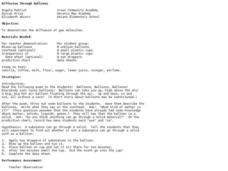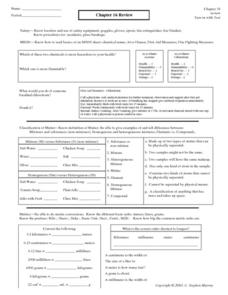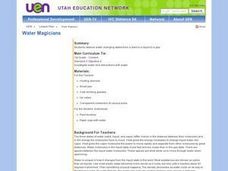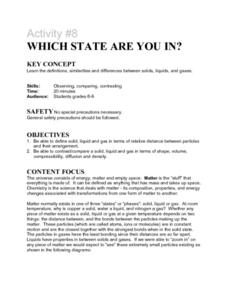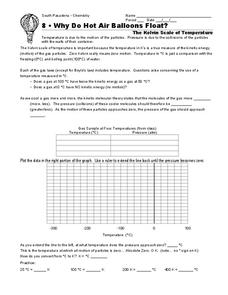Curated OER
Diffusion Through Balloons
Students observe the diffusion of air molecules through a balloon. In this chemistry and molecules lesson, students fill balloons with air and a scented substance and observe whether the scented air is able to permeate the balloon.
Curated OER
Chapter 16 Review- General Science
For this review of general science worksheet, students classify examples of matter as mixtures or substances, homogeneous or heterogeneous mixtures, or elements or compounds. Students also convert several examples using the standard...
Science Geek
The Mole
What can you call a tooth in a glass of water? A one-molar solution! Presentation covers moles, Avogadro's Number, calculating formula mass, converting moles to grams, converting grams to moles, and calculations with moles. It is the...
Science Geek
Covalent Bonding
When it comes to covalent bonds, sharing is caring. Presentation covers the octet rule with multiple examples, Lewis Dot Structures with an example, and resonance. Presentation is the first in a five-part series.
Science Geek
Intermolecular Forces of Attraction
Chemists love London (dispersion forces)! Presentation begins with an explanation of intermolecular forces including hydrogen bonding, dipole-dipole attraction, and London dispersion forces. It also covers polarity and the relative...
Curated OER
Chemistry Practice
In this chemistry overview worksheet, students calculated the volume of different gases and liquids given in a word problem. Students had to calculate the molecular mass and write the empirical formula and the molecular formula.
Curated OER
WS 7.2 Kinetic Theory-Temperature and Volume
In this kinetic theory worksheet, students answer questions about kinetic energy, they calculate volumes of gases at STP, they answer questions about temperature and they convert from one unit of temperature to another.
American Chemical Society
Changing State: Evaporation
Why do experiments require a control? Guide scholars through designing an experiment to see what they can do to evaporate water faster with a lesson that stresses the importance of controlling all variables. The second activity allows...
American Chemical Society
Changing State: Freezing
There are five types of frost: ground frost, air frost, hoar frost, glaze, and rime. Scholars mix ice and salt in a metal container to observe frost forming on the outside of the can. Animations and videos enhance the learning.
Curated OER
Water Magicians
First graders observe water changing states from a solid to a liquid to a gas. They predict what they think happen to ice cubes as they sit out. They paint water with paintbrushes outside the classroom in the sun and watch the water...
Curated OER
Activity #8 Which State Are You In?
Middle schoolers define, give similarites and differences between solids, liquids, and gases. They compare and contrast a solid, liquid and gas in terms of shape, volume, compressibility, diffusion and density. Pupils classigy common...
Curated OER
Dimensional Analysis #2
In this dimensional analysis worksheet, students solve ten conversion problems where they find moles, mass, and molecules using dimensional analysis.
Curated OER
Under Pressure
In this pressure worksheet, students read about Dalton's Law of Partial Pressure, about vapor pressure and about collecting gases over water. They answer 6 questions using the concepts of Dalton's Law of Partial Pressure and they solve 4...
Curated OER
Somethin' Sweet
Students make their own candy. In this science lesson plan, students observe how molecules interact with each other in physical changes and observe how the addition of heat can cause molecules to interact and form new molecules in...
Curated OER
Why Do Hot Air Balloons Float?
In this gases worksheet, students read about the Kelvin scale of temperature, they answer 3 fill in the blank questions about the relationship between temperature and pressure and they plot the temperature and pressure of gas samples at...
Curated OER
Matter and Energy
In this matter and energy worksheet, students identify substances as solids, liquids or gases, they use the kinetic theory to describe the motion of particles and they explain the conservation of mass and energy when a substance changes...
Curated OER
Extracting Oxygen from Moon Rocks
In this extracting oxygen from moon rocks activity, students read about the need for oxygen for lunar colonists. Students solve 2 problems about the lunar mineral ilmenite which contains oxygen and other elements. They find the molar...
Curated OER
Water the Universal Solvent
In this water and solvent learning exercise, learners answer 20 questions about solutes, solvents, polarity in molecules, and the characteristics of water as a solvent. Students answer 3 questions about the lab they completed using...
Curated OER
The Mole
Students investigate moles and Avogadro's hypothesis. In this moles lesson plan, students complete a worksheet by finding the volume of 1 mole of each substance given its density and they find the number of molecules, the formula, the...
Curated OER
Convection and Wind
Students use water, beakers, hot plates, paper dots, and goggles to participate in a hands on activity where they see how a convection current creates wind. In this convection current lesson plan, students participate in a hands on...
Curated OER
Dissolving Solids and Gases
In this dissolving solids and gases worksheet, high schoolers learn that the process of dissolving gas is opposite of the process of dissolving solids. Students answer 3 critical thinking questions about dissolving gases and solids in...
Curated OER
The Nature of Chemical Change: Acting Out An Example
Young scholars illustrate the molecular nature of matter and show that chemical change involves alteration of molecules.
Curated OER
Selling The Molecular Kinetic Theory
Students investigate molecule movement according to the kinetic molecular theory. In this kinetic molecular theory lesson plan, students observe demonstrations showing that molecules speed up with increasing temperature and slow down...
Curated OER
Physical and Chemical Properties of Matter
Students identify the physical and chemical properties of matter. They review the types of matter. Students list the four states of matter (Solid, Liquid, Gas and Plasma). They recognize and describe the different types of matter.


